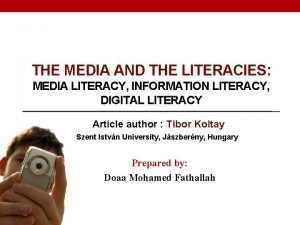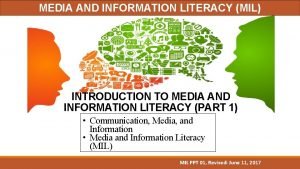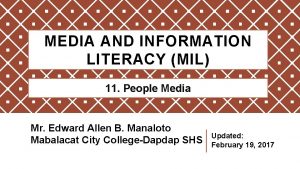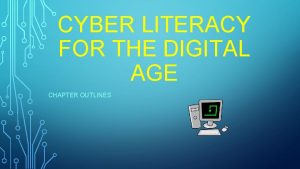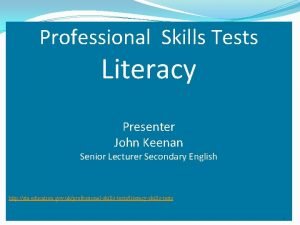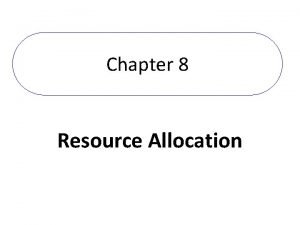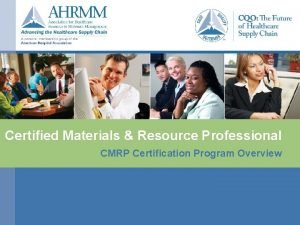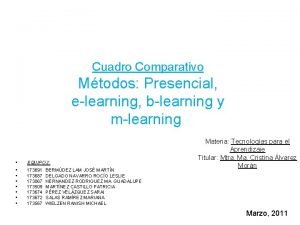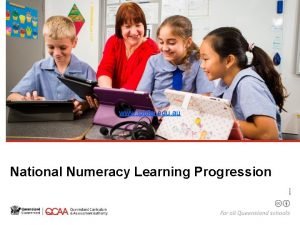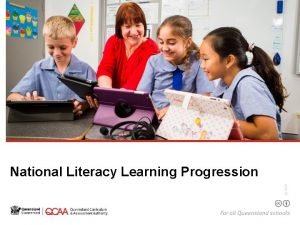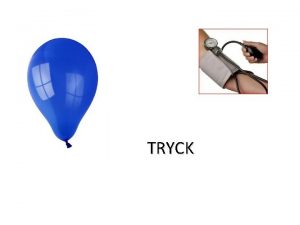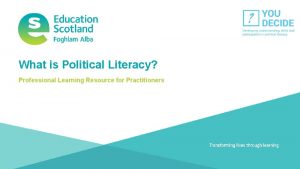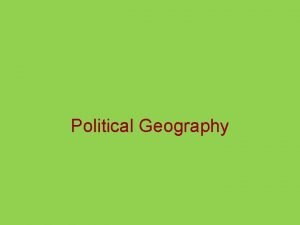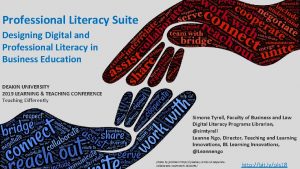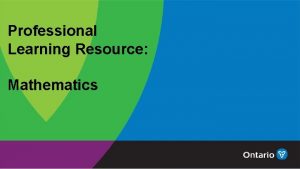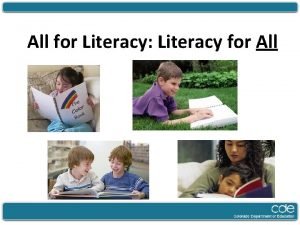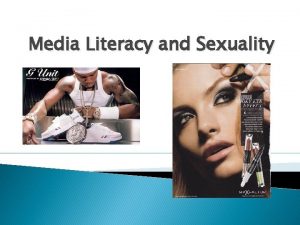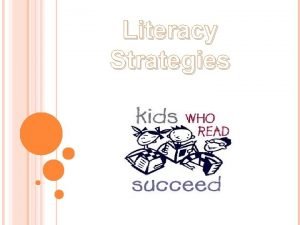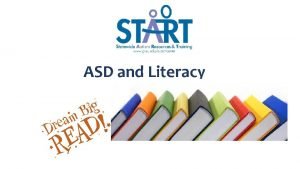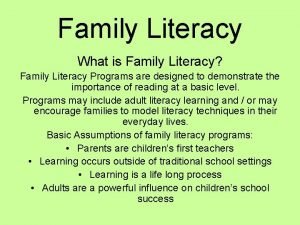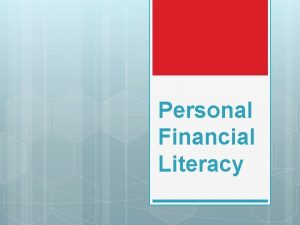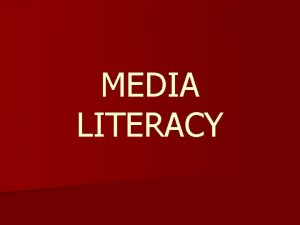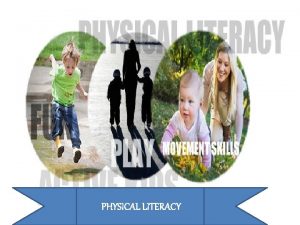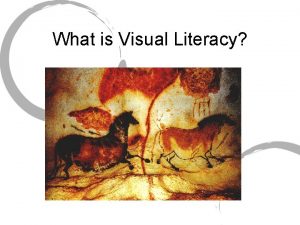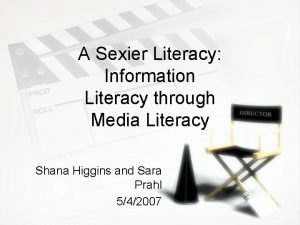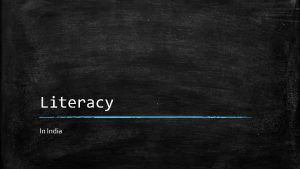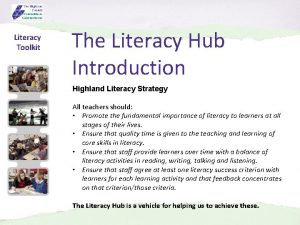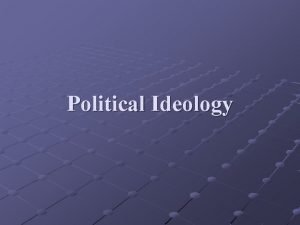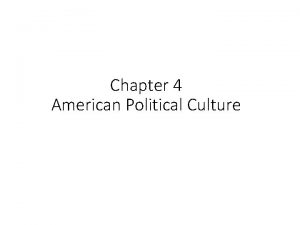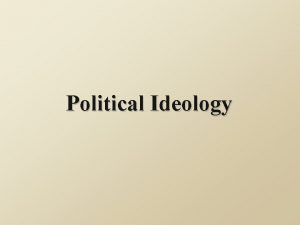What is Political Literacy Professional Learning Resource for



























- Slides: 27

What is Political Literacy? Professional Learning Resource for Practitioners What is political literacy? Transforming lives through learning

Contents 1. What is political literacy? 2. Future scenarios 3. What was the experience of schools and learners during the Scottish referendum? 4. Referendum effect: Votes at 16 5. Understanding the key skills of political literacy? 6. Final reflections What is political literacy? Transforming lives through learning

What is political literacy? (Video) What is political literacy? Transforming lives through learning

Best case scenario in 5 years Futures Scenario: How to build a healthy democracy and engage young people with political processes and ideas? What does political literacy look like in your setting? Democracy Questions and barriers Worst case scenario in 5 years What is political literacy? Transforming lives through learning

Referendum: 16 -17 year old first time voters • 16 -17 year olds vote for the first time • 75% turnout of 16 -17 year olds • 84. 6% overall voter turnout • No – 55. 3% • Yes – 44. 7% What is political literacy? Transforming lives through learning

What is political literacy? Transforming lives through learning

Referendum (teachers’ views): Problems in teaching political issues PROBLEM % OF RESPONSES Lack of curricular time 53 Concern about pupils misreporting bias 42 Lack of suitable materials 39 Concern about handling extreme views RECOMMEND MATERIALS FOR CONTROVERSIAL ISSUES % OF RESPONSES Balanced handouts or materials 28 Debate / discussion 26 DVDs / on-line materials 13 31 Visiting MSPs or other speakers 13 Difficulty of achieving balance 24 Power. Point presentations 7 Other 12 Group work 4 Other 10 What is political literacy? Transforming lives through learning

Referendum (young peoples’ views): What more could the school do to help decide? METHOD % OF RESPONSES Debate or discussion 60 More teaching 34 Presentations 4 Involve pupils more 1 Leaflets < 1 Speakers < 1 What is political literacy? ‘Give us information from both sides of the argument’ ‘We know as much as our parents about political issues’ ‘Age should not be the deciding factor on whether or not you can vote’ Transforming lives through learning

Reflective questions about the referendum? • How effective were schools and community settings in teaching about the Scottish referendum? • What methods did you apply to discussing the referendum? • What were the barriers to you discussing the referendum? • What made the referendum a controversial subject? • What support or guidelines would have made political literacy and referendum discussions easier in your school / community setting? What is political literacy? Transforming lives through learning

Strong evidence to suggest there was a referendum effect. What is political literacy? Transforming lives through learning

VOTING PARTICIPATION IN 2015 GENERAL ELECTION HIGHER VOTER TURNOUT The percentage of 18 – 19 year olds certain to vote by nation and age. (Restricted to those eligible to vote) 18 -19 20 -24 25 -44 45 -64 65 or older England 34 38 51 70 80 63 Scotland 65 57 66 81 88 76 Northern Ireland * * 42 60 74 55 Wales * 28 56 70 82 64 UK 42 39 54 72 82 65 All ages * sample size too small What is political literacy? Transforming lives through learning

POLITICAL ACTION MORE ACTIVE CITIZENS The percentage of 18 – 19 year olds taken part in any political action, by nation and age. Signing a petition, writing to an MP, taking part in a boycott or taking part in a demonstration 18 -19 20 -24 25 -44 45 -64 65 or older England 47 41 48 63 68 56 Scotland 71 54 60 67 63 63 Northern Ireland * * 49 65 67 57 Wales * 41 53 65 65 59 UK 53 43 52 64 67 58 All ages * sample size too small What is political literacy? Transforming lives through learning

SATISFACTION WITH DEMOCRACY BUT UNIVERSAL DISSATISFACTION WITH DEMOCRACY! Percentage ‘very’ or ‘rather’ satisfied with democracy in Britain, by nation and age 18 -19 20 -24 25 -44 45 -64 65 or older England 26 30 29 21 22 25 Scotland 21 25 24 20 22 22 Northern Ireland * * 16 17 21 17 Wales * 20 18 15 21 18 UK 24 26 25 20 22 23 All ages * sample size too small What is political literacy? Transforming lives through learning

18 th June, 2015: Voting age lowered to 16 in Scottish parliamentary elections What is political literacy? Transforming lives through learning

What other countries can vote in national elections at 16? ARGENTINA AUSTRIA ECUADOR What is political literacy? GERMANY BRAZIL HUNGARY NICARAGUA ICELAND CUBA ITALY Transforming lives through learning

What other countries can vote in national elections at 16? ANSWERS ARGENTINA AUSTRIA ECUADOR NICARAGUA CUBA BRAZIL HUNGARY CAN VOTE AT 16 IN HUNGARY IF YOU GET MARRIED What is political literacy? Transforming lives through learning

ATTITUDES OF 16 -17 YEAR OLDS Variables Descriptive results Scotland RUK Making a difference who gets elected % saying 9 -10 on 0 -10 scale 67 39 Making a difference who gets elected % saying a great deal/quite a lot 58 50 Making a difference to own life how UK is governed % saying a great deal/quite a lot 47 40 16 -year olds should be allowed to vote in all elections % approving 66 52 Politics is difficult to understand % strongly agreeing/agreeing 57 60 Political participation % taken part in at least one form 57 40 60 43 Number of information source types What is political literacy? used % used 3 -6 (of 6) Significant difference Marginal difference Non-significant difference Transforming lives through learning

ATTITUDES OF 16 -17 YEAR OLDS Variables Descriptive results Scotland RUK Making a difference who gets elected % saying 9 -10 on 0 -10 scale 67 39 Making a difference who gets elected % saying a great deal/quite a lot 58 50 Making a difference to own life how UK is governed % saying a great deal/quite a lot 47 40 16 -year olds should be allowed to vote in all elections % approving 66 52 Politics is difficult to understand % strongly agreeing/agreeing 57 60 Political participation % taken part in at least one form 57 40 60 43 Number of information source types What is political literacy? used % used 3 -6 (of 6) Significant difference Marginal difference Non-significant difference Transforming lives through learning

ATTITUDES OF 16 -17 YEAR OLDS Variables Descriptive results Scotland RUK Making a difference who gets elected % saying 9 -10 on 0 -10 scale 67 39 Making a difference who gets elected % saying a great deal/quite a lot 58 50 Making a difference to own life how UK is governed % saying a great deal/quite a lot 47 40 16 -year olds should be allowed to vote in all elections % approving 66 52 % strongly agreeing/agreeing 57 60 % taken part in at least one form 57 40 60 43 Politics is difficult to understand Political participation Number of information source types What is political literacy? used % used 3 -6 (of 6) Significant difference Marginal difference Non-significant difference Transforming lives through learning

ATTITUDES OF 16 -17 YEAR OLDS Scotland (%) RUK (%) Yes, as a course I had to take 21 20 Yes, as a course I chose to take, but didn’t have to take 43 18 Yes, but I don’t know whether I had to take it 4 12 No 32 50 Yes 64 54 No 32 40 Didn’t have classes 4 6 Yes 63 39 Variables Have you ever taken a subject in school in which mainly issues about politics and society were discussed? Have you been in a class in school during the last three months in which current political issues were discussed? Discussed how the UK is governed in the last three months with family Discussed how the UK is governed in the last three months with friends What is political literacy? Descriptive results Yes 65 38 Significant difference Marginal difference Non-significant difference Transforming lives through learning

Voting at 16 –What next? • Early enfranchisement in the referendum has been successful • Lasting positive effect on young people in Scotland • Differences between Scotland RUK partially because of differences in political education and more young Scots engaged in political discussion • Positive effect because of discussions of politics in the classroom • Distinctive role formal “civics” education and classroom discussions as well as the role of family and friends • BUT - There is a substantial amount of inequality in terms of access to political education What is political literacy? Transforming lives through learning

Identify the key skills of political literacy DEBATE PARTICIPATIO N RESEARCH SKILLS What is political literacy? Transforming lives through learning


Early First Demonstrates how to use different resources to find interesting information, e. g. photograph, poster, story book Chooses a useful resource to learn something new. Understands what a question is asking. Finds and selects different information to answer a question. Creates a number of specific questions to research a topic. Finds and selects relevant information from a range of sources. Identifies and decides what sources are trustworthy with justification. Skims and scans text to select and record information from a source to take notes under headings. Paraphrases information to make notes under headings. Summarises the main points of research into own words in a concise piece of text. Describes an event Listens to the views of others and responds with own views Develops an argument on a local Develops an argument and issue supplies evidence for a local issue. Compares arguments on a local issue. Organises evidence for an argument in a logical manner. Debate Research Skill Second Third Fourth Creates a hypotheses for a piece of research. Uses a range of evidence to link information to a theme or issue. Identifies exaggeration and bias in a source of information. Identifies sources to support an argument or theory. Analyses a range of evidence to answer a question and conduct research. Evaluates evidence to investigate a hypotheses. Evaluates the usefulness of a source of information in terms of author, date published /written, content, purpose, bias and exaggeration. Evaluates evidence to develop a sustained line of argument, informed opinion or justified conclusion. Uses a range of evidence to form an opinion. Identifies and accepts others’ points of view Focuses on argument and purpose to engage an audience. Uses a range of evidence to develop a sustained line of argument and persuade others on a controversial issue.

Suggested themes for assessment within political literacy Rights Local and Global Citizenship Cooperation and conflict Fairness, Justice and Rule of Law Participation Make Say Write Do DVDs/Films/animations/radio programmes and podcasts about social issues, local people and community Creating campaign materials and displays/viral ads or campaigns for social media Collecting, editing and presenting news material for mock publications or broadcasts TV /poster adverts Publicity flyers Information factsheets Academic posters Audio-Visual presentations Graffitti wall/models/artwork as communication Talking heads video clips Digital storytelling Blogs, wikis etc. Graphs/maps/infographics Answering questions and giving ideas during story sessions Asking questions about issues Offering explanations for ideas Building on the ideas of others Use of effective questioning /higher order skills Presenting to an audience Delivering speeches and talks Creating campaign songs Floor questions in debates Experience of a variety of formal and informal debate and discussion techniques/discussions with key figures Hustings event Peer reflections Campaign posters (with key message) Captions for photos Story beginnings/endings Evaluations/Peer Evaluations – ‘I like this because…’ ‘I don’t like this because…’ Lists giving tips or advice Letters/emails to… Postcards to…from… Reflective journal entries Protest banners Extended writing about…(reports, articles, essays, diaries, biographies, obituaries, manifestos, policy writing) Social media conversations/blogs Surveys/questionnaires/ opinion polls Note taking and making for research Any actions that convey participation e. g. litter pick; garden tidy; class/group rep; Fair Trade/shoe box appeals/school committee etc. Local and global action campaigns Planning and running information or enterprise days/fairs/ Designing and making advertising materials Supporting local organisations Volunteering for charities and other organisations Planning and organising hustings to discuss social issues Participating in local environmental action (e. g. clean-ups, Soup kitchens etc. Holding a debate to persuade others Running a TV station / radio station / school newspaper / magazine / online chat / youtube channel Conducting surveys / opinion polls Running a mock election or school committee Researching methods and higher order thinking

Reflective questions • What more could schools and community settings do to develop the key skills of political literacy? • What would a good political literacy lesson / programme look like for you subject / stage / school / community setting? • What further professional support or training do you require to give you confidence with political literacy skills? What is political literacy? Transforming lives through learning

Education Scotland Denholm House Almondvale Business Park Almondvale Way Livingston EH 54 6 GA T +44 (0)141 282 5000 E enquiries@educationscotland. gsi. gov. uk https: //education. gov. scot What is political literacy? Image Copyright - The Noun Project: Mazil, Ryan Beck, Luis Prado, Marek Polakovic, Blake Thompson, Creative Stall, Darin S, Brennan Novak, riyazali, Ahmed Elzahra, Desbenoit, Julynn B, Baruch Moskovits, Simple Icons, Geral Wildmoser, Mathieu Dedebant, Jon Prepeluh, Mourad Mokrane, Sarah Joy, Evan Mac. Donald, Juan Pablo Bravo, Dan Hetteix, Arthur Shlain Transforming lives through learning
 Media literacy vs information literacy comparison
Media literacy vs information literacy comparison Introduction to mil
Introduction to mil People as media mean
People as media mean Cyber literacy for the digital age
Cyber literacy for the digital age Literacy professional skills test
Literacy professional skills test Resource loading vs resource leveling
Resource loading vs resource leveling Contoh resource loading
Contoh resource loading Cmrp certification exam
Cmrp certification exam Cuadro comparativo e-learning m-learning b-learning
Cuadro comparativo e-learning m-learning b-learning Numeracy continuum qld
Numeracy continuum qld Literacy continuum acara
Literacy continuum acara Formuö
Formuö Novell typiska drag
Novell typiska drag Tack för att ni lyssnade bild
Tack för att ni lyssnade bild Ekologiskt fotavtryck
Ekologiskt fotavtryck Varför kallas perioden 1918-1939 för mellankrigstiden
Varför kallas perioden 1918-1939 för mellankrigstiden En lathund för arbete med kontinuitetshantering
En lathund för arbete med kontinuitetshantering Underlag för särskild löneskatt på pensionskostnader
Underlag för särskild löneskatt på pensionskostnader Tidböcker
Tidböcker Anatomi organ reproduksi
Anatomi organ reproduksi Densitet vatten
Densitet vatten Datorkunskap för nybörjare
Datorkunskap för nybörjare Stig kerman
Stig kerman Hur skriver man en tes
Hur skriver man en tes Magnetsjukhus
Magnetsjukhus Nyckelkompetenser för livslångt lärande
Nyckelkompetenser för livslångt lärande Påbyggnader för flakfordon
Påbyggnader för flakfordon Vätsketryck formel
Vätsketryck formel
